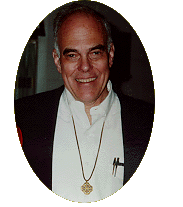Home > News > David B. Burrell on the relation between Creator and creatures as the key to Aquinas
David B. Burrell on the relation between Creator and creatures as the key to Aquinas
Notre Dame, February 1998 - David B. Burrell C.S.C. is the Theodore M. Hesburgh Professor in the College of Arts and Letters at the University of Notre Dame, where he teaches in the Departments of Theology and of Philosophy. His areas of specialization include philosophical theology, Islamic philosophy and comparative theology.
What courses are you teaching this semester?I am teaching one graduate course on the Metaphysics of Creation. I read with the students medieval Jewish, Christian and Islamic texts and we discuss how these texts can help us to critique contemporary treatments of the subject.
Together with my colleague Steve Watson I teach also an undergraduate course, entitled 'Postmodernism and Theology'. It is a 'sexy course'. We use Fergus Kerr's new book Immortal Longings, in which he presents a number of 20th century philosophers, a.o. Heidegger, Martha Nussbaum and Lucy Irigaray, and indicates their contributions to contemporary theology. In class we read and discuss ourselves texts of the very same authors in view of their theological relevance.
Are you doing any research on Aquinas now?
Not directly. I am working on the medieval Islamic thinker Al-Ghazali. You might say that my leading question in this project is why Al-Ghazali is not the Islamic Thomas Aquinas, but has more the character of an Islamic Augustine. When I am doing research, even if it is not explicitly on Aquinas, he is yet in one way or another always at the back of my head. Studying a thinker like Al-Ghazali and comparing him tacitly with Aquinas, make me realize again how amazing Aquinas' synthesis really is.
What is the most important thing you learned from Aquinas?
Probably the most important thing I learned from Aquinas is to use language properly, especially in divinis. 'Properly' here means 'analogously'. Creation, that is the relation between Creator and creature, is the central key to Aquinas' thought. It is not only the hidden key to his philosophy, as Pieper said, it also permeates his theological discourse. The uniqueness of this relation, for which Sokolowski has coined the expression 'the Christian distinction', excludes any univocal language. It qualifies all our God-talk as analogous. In my experience, many philosophers have no feeling for this. They are caught up in their conceptual analyses, distinctions and definitions which all presuppose the univocity of our language when used in talking about 'divine things'. They tend to talk about God as a being, and seem to forget that he is the Creator, that is the Cause of all being. Theologians are often more susceptible to the peculiar status of God-talk.
What works of Aquinas are you most familiar with?
The Summa Theologiae and the Disputed Questions. I consider the former a condensed version of the latter. When studying an interesting or puzzling passage in the Summa, I'll usually check the parallel texts in the Disputed Questions. I have read all the Commentaries on Aristotle, and I think I know De Ente et Essentia almost by heart. For some reason, but actually I don't know why, I am not very familiar with the Summa contra Gentiles or with the Commentary on the Sentences.
What is the importance of Aquinas-research for our times?
Some time ago, Joseph Ratzinger pointed out two key issues for contemporary theology: that of the other faiths and of creation. In trying to articulate our view on creation, that is the relation of Creator to creatures, Aquinas is indispensable. His discussions of e.g. Maimonides and Avicenna also set a good example of how to conduct a fruitful dialogue with other faiths. On the other hand, research on Maimonides, Avicenna and others has shown that Aquinas' synthesis between philosophy and theology was already an achievement of intercultural and interreligious discourse. Aquinas' synthesis should be considered not only an achievement of Latin Paris, but also of Naples as one of the most important centers for cultural exchange between the Islamic world and the Christian West. One may also note the outstanding position John Damascenus has as a theological authority for Aquinas; Damascenus was strongly involved in dialogue with Muslims.
What is do you think of the Thomas Instituut?
Based on the fellows from the Instituut that I know and their publications that I read, I think very highly of it. It has a strategic position to strengthen the current recovering of Aquinas as a theologian. You have the sources available in Utrecht and you are not hindered so much as we are in the United States by the old 'Thomistic' tradition that sees Aquinas primarily as a philosopher. Thanks to Ferdinand de Grijs you have a short, but already rich tradition in interpreting Aquinas.
I see a particular strategic advantage of the Instituut in that it may mediate between German, French and Anglo-Saxon scholars. With your location at Utrecht and the proficiency in modern languages of the Dutch, you can play an important rule in improving the communication among these scholars.
Harm Goris
